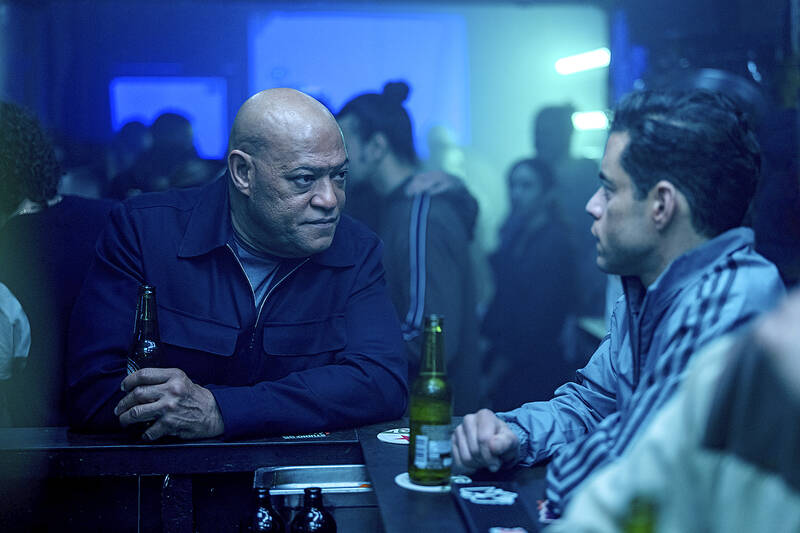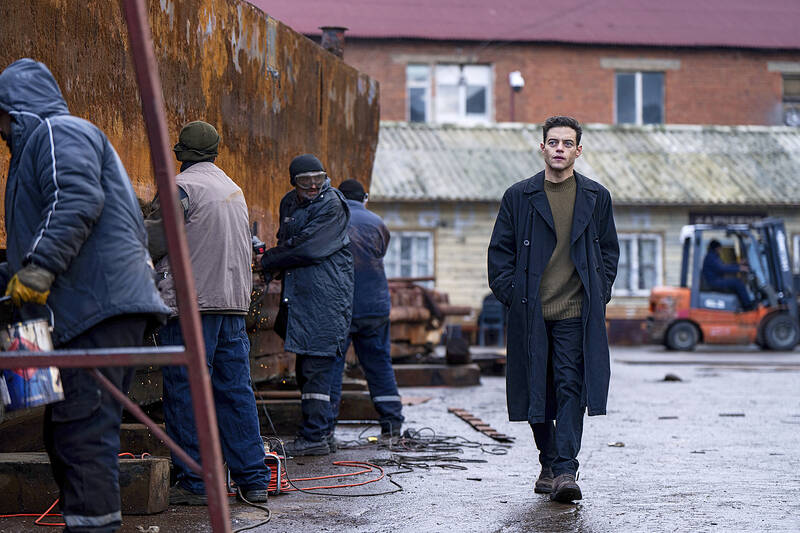Before Jack Ryan was introduced into the culture, Robert Littell imagined Charlie Heller, a quiet, CIA cryptographer who goes rogue on a quest for vengeance after his love is killed by terrorists.
As star of The Amateur, currently in Taiwan theaters, Rami Malek gets to be both skittish nerd and coolly competent angel of death. He’s the homebody and perpetual rule-follower who in grief-stricken madness decides to blackmail his bosses and go on an international killing spree to get the people responsible for her death.
The story is based on a book published in 1981 — a product of its Cold War context that was even made into a movie starring John Savage. But even with the Iron Curtain and the Holocaust in its DNA, it also has the kind of foundation that’s essentially evergreen in Hollywood. There’s tragedy, drama, cinematic globetrotting and a fish-out-of-water story that’s a little more relatable than watching some preternaturally talented superspy (at least in theory).

Photo: AP
In this newest take, credited to screenwriters Ken Nolan and Gary Spinelli and directed by James Hawes, the story has been updated for the modern age, with decidedly murky international politics and sophisticated facial and voice recognition software that can identify masked terrorists and their networks and find rogue agents in an instant.
The locations are many: London, Paris, Marseille, Istanbul included. The cast is stacked: Laurence Fishburne is a veteran assassin who agrees to train Charlie, Rachel Brosnahan is the dead wife, Julianne Nicholson is the CIA director, Holt McCallany is Charlie’s shady boss. Jon Bernthal, Caitriona Balfe and Michael Stuhlbarg also play pivotal roles. And anyone who has seen the trailer has already gotten a preview of the most impressive set piece, involving a glass infinity pool.
The Amateur has a lot going for it — but it takes also takes a while to get going. Once it does, it can’t quite maintain a level of energy and suspense needed to justify its runtime. This might be because the film is attempting to be something that’s equal parts action-packed and meditative, but for us that means listening to several conversations about the nature of killing that start to sound quite repetitive.

Photo: AP
There’s this throughline that Charlie is not a born killer. While a court of law might disagree, everyone in this film seems to think that there’s something different between shooting someone point blank and, say, setting up an elaborate trap that you know will result in a death. Still, it seems like that is a debate that could end after he does intentionally kill someone and goes looking for more.
It’s interesting what a film like this chooses to focus on and what it disregards. At the beginning, Charlie declines his wife’s invitation to accompany her to London, where she will of course die. He regrets this deeply, but we’re also told that he always declines: He doesn’t travel internationally almost as a rule. Why? Unclear, but you’d think perhaps this might factor into the plot somehow as he begins his globetrotting.
Instead, it’s not an issue at all: He capably navigates all manner of transport across Europe, from cargo flights to busses full of migrants. There are other underdeveloped curiosities, like Jon Bernthal as a cool guy superspy with basically two scenes that don’t seem to advance the story at all. And don’t get me started on poor Brosnahan as the dead wife who we’re constantly being told “mattered” but who we know so little about. Sarah is often seen in flashback in flowy floral dresses doting on her quirky husband in their idyllic Virginia farmhouse. To the film’s credit, they don’t show her laughing under white sheets.

Photo: AP
But perhaps this is asking too much of a big screen spy spectacle in which Malek is compelling as an unlikely vigilante — even if we might not totally understand why he’s decided this is the only way. He doesn’t exactly sell it the way Harrison Ford was able to in Patriot Games, though that’s an unfair bar.
With James Bond in a reset mode and Ethan Hunt promising final reckonings, most of the good globetrotting spy thrillers seem to have migrated to the small screen lately. Something about the episodic nature of it suits the genre, whether it’s Slow Horses, Black Doves or even Jack Ryan. But, as with Black Bag from earlier this year, it’s always welcome when we get an offering on the big screen: They just look better there.

Photo: AP

April 14 to April 20 In March 1947, Sising Katadrepan urged the government to drop the “high mountain people” (高山族) designation for Indigenous Taiwanese and refer to them as “Taiwan people” (台灣族). He considered the term derogatory, arguing that it made them sound like animals. The Taiwan Provincial Government agreed to stop using the term, stating that Indigenous Taiwanese suffered all sorts of discrimination and oppression under the Japanese and were forced to live in the mountains as outsiders to society. Now, under the new regime, they would be seen as equals, thus they should be henceforth

Last week, the the National Immigration Agency (NIA) told the legislature that more than 10,000 naturalized Taiwanese citizens from the People’s Republic of China (PRC) risked having their citizenship revoked if they failed to provide proof that they had renounced their Chinese household registration within the next three months. Renunciation is required under the Act Governing Relations Between the People of the Taiwan Area and the Mainland Area (臺灣地區與大陸地區人民關係條例), as amended in 2004, though it was only a legal requirement after 2000. Prior to that, it had been only an administrative requirement since the Nationality Act (國籍法) was established in

Three big changes have transformed the landscape of Taiwan’s local patronage factions: Increasing Democratic Progressive Party (DPP) involvement, rising new factions and the Chinese Nationalist Party’s (KMT) significantly weakened control. GREEN FACTIONS It is said that “south of the Zhuoshui River (濁水溪), there is no blue-green divide,” meaning that from Yunlin County south there is no difference between KMT and DPP politicians. This is not always true, but there is more than a grain of truth to it. Traditionally, DPP factions are viewed as national entities, with their primary function to secure plum positions in the party and government. This is not unusual

US President Donald Trump’s bid to take back control of the Panama Canal has put his counterpart Jose Raul Mulino in a difficult position and revived fears in the Central American country that US military bases will return. After Trump vowed to reclaim the interoceanic waterway from Chinese influence, US Defense Secretary Pete Hegseth signed an agreement with the Mulino administration last week for the US to deploy troops in areas adjacent to the canal. For more than two decades, after handing over control of the strategically vital waterway to Panama in 1999 and dismantling the bases that protected it, Washington has